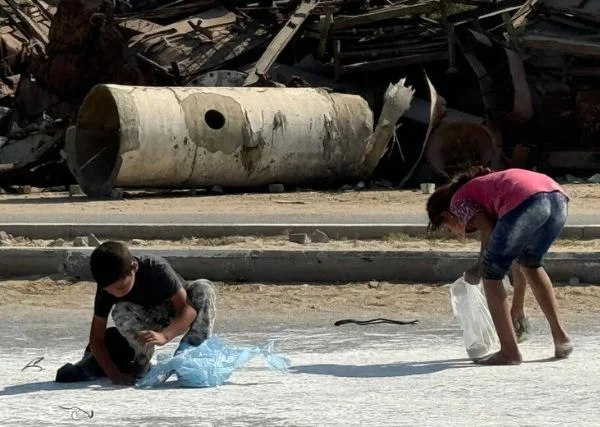Over 1.6 million people in Gaza urgently need shelter, food, water, and medical care..jpeg)
Displaced Palestinians in a makeshift site of Al Mawasi, in Khan Younis, where tents were flooded by rain and high tides overnight on 25 November. Photo by OCHAThe humanitarian crisis in Gaza continues to deteriorate, marked by widespread displacement, loss of life, and the collapse of basic services.
Thousands of displaced Palestinians, particularly in areas like Al Mawasi in Khan Younis, are living in makeshift shelters that have been severely affected by the recent heavy rains and rising tides.
These weather conditions have flooded tents, destroyed belongings, and left people vulnerable to further displacement, particularly along Gaza's coastal regions.
Over 1.6 million people in Gaza, many residing in these temporary shelters, are facing urgent needs for adequate shelter, food, water, and medical care.
On 5 November 2024, two children collect spilled flour on Salah Ad Din Road, Deir al Balah, Gaza. Photo by OCHA.The situation is compounded by a severe lack of winterization measures, with critical items like tarpaulins and shelter kits stuck outside the Gaza Strip due to restrictions and logistical challenges.
The severe overcrowding in shelters, particularly in Gaza City, has intensified health risks, with diseases like respiratory infections and acute malnutrition on the rise.
The number of children suffering from severe malnutrition has surged dramatically, signaling a worsening nutritional crisis.
Additionally, Israeli military operations continue to target civilian infrastructure, including hospitals, exacerbating the already dire conditions.
Kamal Adwan Hospital in North Gaza, which has already been attacked multiple times, has been particularly affected by the ongoing violence, while the health sector as a whole is overwhelmed by the scale of injuries and the lack of medical supplies.
The humanitarian response is facing significant challenges, including the looting of aid convoys and restricted access to affected areas, especially in northern Gaza.
Despite efforts from international organizations, including the UN and MSF, the situation remains critical, with the local infrastructure and medical teams stretched to their limits.
The continuous violence and displacement, alongside the lack of sufficient aid and medical care, continue to make survival increasingly difficult for the people of Gaza.
Source: OCHA OPT











.jpeg)
Social Plugin